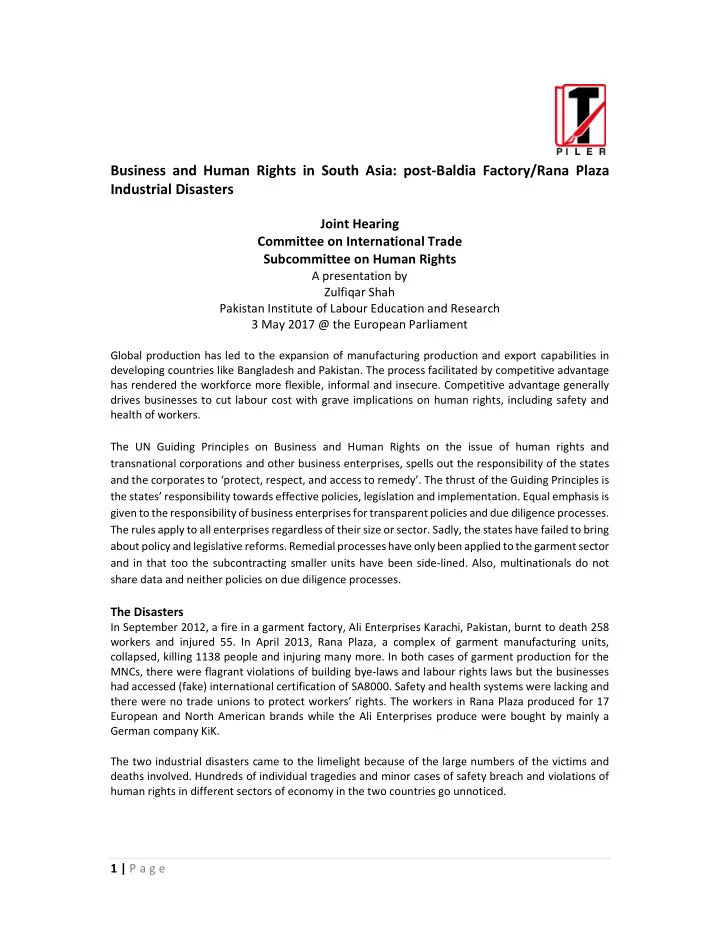

Business and Human Rights in South Asia: post-Baldia Factory/Rana Plaza Industrial Disasters Joint Hearing Committee on International Trade Subcommittee on Human Rights A presentation by Zulfiqar Shah Pakistan Institute of Labour Education and Research 3 May 2017 @ the European Parliament Global production has led to the expansion of manufacturing production and export capabilities in developing countries like Bangladesh and Pakistan. The process facilitated by competitive advantage has rendered the workforce more flexible, informal and insecure. Competitive advantage generally drives businesses to cut labour cost with grave implications on human rights, including safety and health of workers. The UN Guiding Principles on Business and Human Rights on the issue of human rights and transnational corporations and other business enterprises, spells out the responsibility of the states and the corporates to ‘protect, respect, and access to remedy’. The thrust of the Guiding Principles is the states’ responsibility towards effective policies, legislation and implementation. Equal emphasis is given to the responsibility of business enterprises for transparent policies and due diligence processes. The rules apply to all enterprises regardless of their size or sector. Sadly, the states have failed to bring about policy and legislative reforms. Remedial processes have only been applied to the garment sector and in that too the subcontracting smaller units have been side-lined. Also, multinationals do not share data and neither policies on due diligence processes. The Disasters In September 2012, a fire in a garment factory, Ali Enterprises Karachi, Pakistan, burnt to death 258 workers and injured 55. In April 2013, Rana Plaza, a complex of garment manufacturing units, collapsed, killing 1138 people and injuring many more. In both cases of garment production for the MNCs, there were flagrant violations of building bye-laws and labour rights laws but the businesses had accessed (fake) international certification of SA8000. Safety and health systems were lacking and there were no trade unions to protect workers’ rights. The workers in Rana Plaza produced for 17 European and North American brands while the Ali Enterprises produce were bought by mainly a German company KiK. The two industrial disasters came to the limelight because of the large numbers of the victims and deaths involved. Hundreds of individual tragedies and minor cases of safety breach and violations of human rights in different sectors of economy in the two countries go unnoticed. 1 | P a g e
Post-Disaster Remedial Measures Compensation Pakistan state has employment risk benefits (death and injury compensation) schemes in place for registered workers. Due payments were made by the state to the victims and families. German firm KiK, the main buyer of the Ali Enterprises products, signed an agreement with Pakistan Institute of Labour Education and Research soon after, paid $1 million as short term compensation which was distributed by the Sindh High Court as immediate relief to the victims and their families. Negotiations with KiK for long term payment were mediated by the ILO. In 2016, KiK paid US$ 5.15 million to fund loss of income, medical and allied care and rehabilitation costs to the injured survivors and dependents of those killed in the disaster. Bangladesh has no national scheme for employment risks. The Rana Plaza Arrangement, set up under the supervision of the ILO in 2013 and collected funds ($30 million) from the multinational brands and other sources, paid compensation to the 3,120 victims (the injured and families of the dead) by October 2015. Several families are still struggling for compensation. About 42 percent of the survivors are still unemployed. Health and Safety Supported by the ILO, a 3-year Joint Action Plan for Promoting Workplace Safety and Health in Sindh (2013-2016) by the Government of Sindh, Employers Federation of Pakistan and Pakistan Workers Federation was initiated in January 2013. The plan included formulation of provincial OSH policies and strengthening of labour inspection. In 2016 a 5-year, ILO supported project Strengthening National Capacity for ILS Compliance in Pakistan began to induct and train labour inspectors. However, there has been no visible impact of the plans on the ground. According to an assessment carried out under the Joint Action Plan , there were only 547 labour inspectors and 351,689 registered industrial and commercial establishments and factories in Pakistan. The Accord on Fire and Building Safety in Bangladesh was signed in May 2013. It is a five year independent, legally binding agreement between global brands and retailers and trade unions to ensure safe work conditions in the garment Industry. The Accord has been signed by over 200 apparel brands, retailers and importers from over 20 countries in Europe, North America, Asia and Australia; two global trade unions; and eight Bangladesh trade unions and four NGO witnesses. All factories producing for Accord signatory companies are subject to independent inspections on fire, electrical and structural safety. By April 2017, of the 2200 Accord factories 1560 factories have been inspected and172 factories closed down. Remediation is nearing completion at more than 400 factories and 61 factories have completed all steps of remediation. The ILO-supported National Tripartite Plan of Action on Fire Safety & Building Integrity was initiated by the government in 2013 to improve working conditions in the sector through labour law reforms, adoption of national OHS policy and strengthening of labour inspectorate. In addition, a 3-year Better Work Bangladesh – a partnership between the ILO and the International Finance Corporation was launched in 2014. Accountability In the Baldia factory fire case, three inquiries conducted by the Police Officers Committee, the Federal Investigation Agency and the Judicial Tribunal established that the owners had committed gross violations of laws and various government departments were involved. The initial proceedings—filing of the, charge sheet and the arrest of the factory owners in October 2012—gave hope that the justice would be done and those responsible for criminal negligence would be brought to task. The murder case against the owners and others is still pending in the court and the culprits are at large, on bail, out of country. 2 | P a g e
Recommend
More recommend